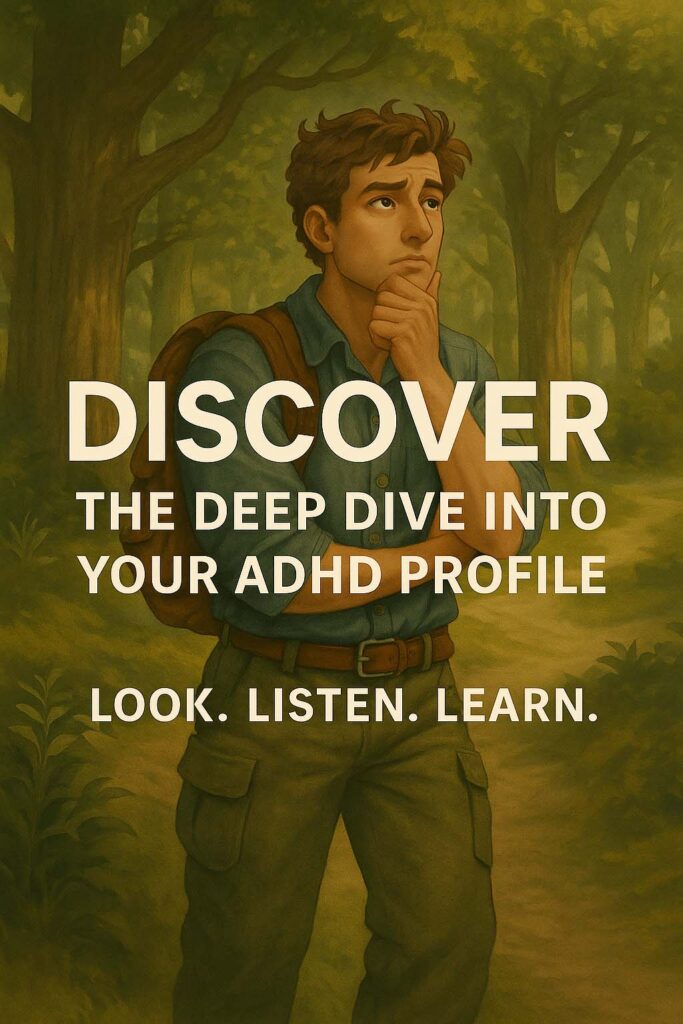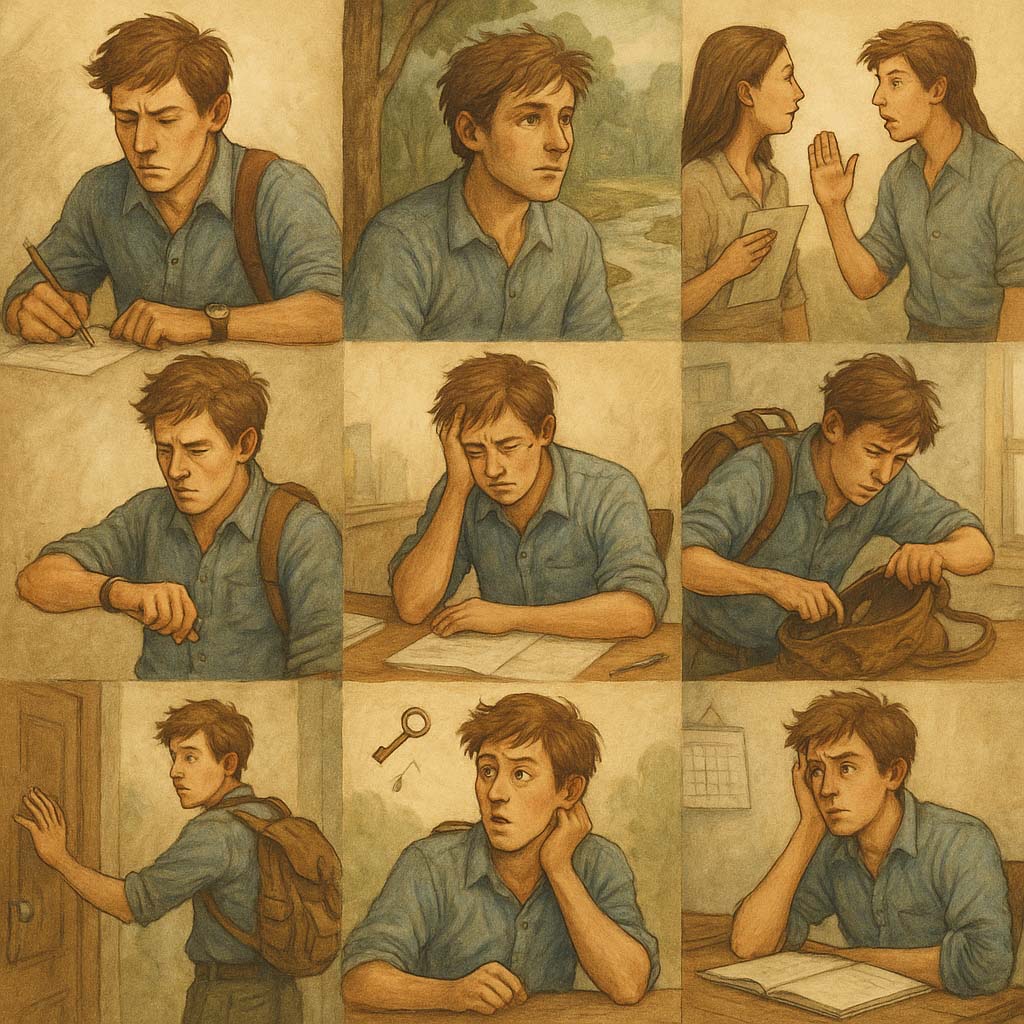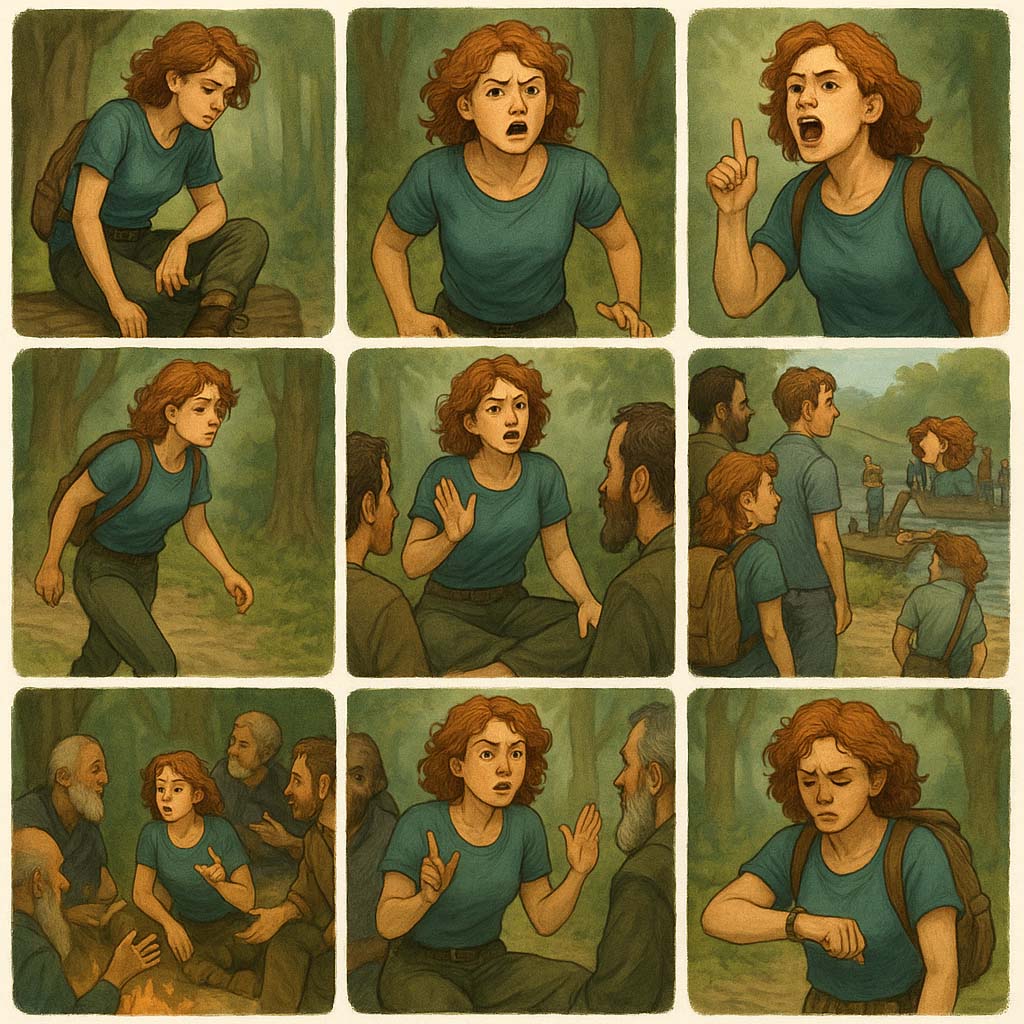
🧭 Discover
🌿 A Journey into the Heart of Attention
There is a map inside you,
etched not in lines and borders,
but in patterns of thought,
currents of feeling,
and restless rivers of motion.
Not all trails are straight.
Not all paths are paved.
Some wander, some dance, some drift.
DISCOVER is not a test, nor a measure.
It is a lantern — held gently —
to light the places within you
where attention sings, falters, stirs, and soars.
You are not here to be judged.
You are here to look with kindness,
to listen with curiosity,
to learn the secret shapes of your own becoming.
Welcome to the beginning of your unfolding. 🌿


🌟 DISCOVER
See your patterns. Hear your internal rhythms. Learn how to navigate with wisdom.
Why Discover Matters
You cannot change what you cannot see.
In the FLOURISH journey, DISCOVER is your magnifying glass — helping you see the unique ways ADHD shows up in your life. But we don’t stop at surface-level labels. We explore what it looks like, sounds like, and feels like inside your mind — because most distractions in ADHD are not "out there" in the world. They are internal, woven through thought loops, emotional echoes, and invisible patterns.
Through Look, Listen, Learn, you’ll begin to uncover how your attention flows, where it falters, and how your strengths and struggles interlace. Armed with this knowledge, you’ll be able to work with your ADHD, not against it.
🌀 Inattention
A Mind That Wanders, A Mind That Dreams
Sometimes, it’s not that we aren't paying attention — it’s that our attention drifts elsewhere, almost like a leaf carried by a stream, without our permission or even our awareness. Inattention in ADHD is often invisible to others, but its effects ripple through daily life — forgotten appointments, overlooked details, abandoned dreams. Yet, within this wandering lies a hidden strength: a deep capacity for creativity, intuition, and original thinking. To harness it, we first need to notice how and where our attention moves. The DISCOVER phase invites you to look closely at the way your mind dances — not with blame, but with curiosity — and to find ways to bring its gifts into clearer focus.
Here are nine core ways inattention might show up — each a doorway to understanding your unique rhythm:

🧩 Careless mistakes
Attention to fine detail can feel elusive, especially when the task feels routine or uninteresting. This can lead to small but significant mistakes — misreading instructions, skipping steps, or rushing through important parts — undermining the best intentions. Over time, these errors can create self-doubt, masking the true capabilities hiding beneath the surface.

🧩 Difficulty sustaining attention
Sustaining focus is like trying to hold water in your hands: at first, it seems possible, but gradually it slips away. Boredom or fatigue can set in quickly, making even important tasks feel impossible to complete without mental breaks or a fresh source of interest. It often feels as though motivation itself flickers and dims unpredictably, even when the stakes are high.

🧩 Spacing out in conversations
Listening might seem effortless to others, but for those with ADHD, attention drifts mid-conversation. You might miss instructions, lose the thread of discussions, or feel embarrassed when you realise you’ve “zoned out” — even when you genuinely care about what’s being said. Relationships can suffer, not from lack of interest, but from lapses in attention.

🧩 Side tracked, muddled
Ideas flow easily; starting new projects feels exciting. But completing them? That’s the hard part. Tasks often remain half-finished, whether it's an assignment, a work project, or even something simple like folding laundry — leaving a sense of frustration and unfinished momentum. The energy that began in enthusiasm often fades into a fog of scattered priorities and unmet goals.

🧩 Daily Disorganization
Life can feel like a messy desktop — cluttered with papers, tasks, and to-dos jumbled together. Finding what you need, when you need it, can be an exhausting task in itself, leading to missed deadlines, forgotten priorities, and mounting overwhelm. Disorganization isn’t just about clutter; it’s about battling a thousand invisible tasks clamouring for attention at once.

🧩 Procrastination
Tasks that demand sustained, concentrated effort — such as paperwork, reading long documents, or solving complex problems — can feel daunting. Often, there’s a strong urge to avoid them entirely, or to procrastinate until deadlines loom. It’s not about laziness — it’s about the brain’s hunger for stimulation, resisting anything that feels slow, boring, or overly demanding.

🧩 Misplace personal items
Objects seem to vanish into thin air. Wallets, phones, glasses — things you just had a minute ago. Misplacing items is often not about memory loss, but about moments of inattention when placing or handling them, making retrieval later difficult. This can create daily frustrations, emotional turbulence, and a sense of being unreliable — even when your intentions are good.

🧩 Distraction
A noise, a fleeting thought, a visual distraction — anything can whisk your mind away from the task at hand. Even internal distractions, like a random memory or idea, can cause you to drift far from your original focus without even realising it. Sometimes the biggest distractions come not from the outside world, but from the rich, busy landscape of your inner world, your own thoughts.

🧩 Forgetfulness
You may have had every intention of attending that meeting or completing that task, but without robust external reminders, these obligations slip away. Forgetfulness isn’t about not caring; it’s about the challenge of holding multiple threads of intention at once. The invisible toll of constantly losing and regathering mental threads can leave you feeling scattered and self-critical.

🌟 Strategies to Explore
In your upcoming sessions, you’ll have the opportunity to explore and experiment with strategies to navigate these challenges, such as:
- Using Checklists and Visual Anchors: External supports to guide your attention step-by-step.
- Chunking Work into Smaller Segments: Breaking tasks into micro-steps that feel more achievable.
- Mindful Pause Practices: Creating small reflection points to reset attention during tasks.
- Environmental Optimisation: Minimising distractions around you to strengthen focus.
- Pomodoro and Brain Break Techniques: Structuring work and rest rhythmically to sustain effort.
- Memory Cues and Habit Structures: Using consistent triggers and routines to reinforce recall.
✨ As you explore the DISCOVER page, start to notice:
- Which symptoms feel most familiar?
- Which ones would you most like to change or understand more deeply?
In your next coaching session, you’ll be invited to choose the areas that resonate most — shaping your journey ahead with Mon as your Life Guide.

🌀 Hyperactivity and Impulsivity
A Body and Mind Always in Motion
Hyperactivity and impulsivity in ADHD aren’t always about physical movement you can see. Sometimes it’s an inner hum, a restless current of thought and energy that never quite stills. Other times, it bursts outward — a word blurted out too soon, a constant shifting in your chair, a pace that feels just a little faster than the world around you. Yet hidden within these patterns is a drive, a vitality, and a spirit that can be incredible assets when well-chanelled.
In the DISCOVER phase, we look at how this energy expresses itself — not to suppress it, but to understand and harness it in ways that honour your mind, body, and soul.
Here are nine core expressions of hyperactivity and impulsivity — each offering clues to your unique energy signature:

🔥 Fidget
You might find yourself bouncing a leg, tapping a pen, or twisting a ring without even realising it. Fidgeting often isn’t a choice — it’s a way your body tries to create stimulation when the world feels too slow, and focus feels slippery. Rather than a sign of disrespect or boredom, fidgeting is often a self-regulation tool, helping your brain stay just stimulated enough to concentrate.

🔥 Stand Up
Sitting still can feel like a slow boil of discomfort — meetings, classrooms, family dinners become endurance tests. You might find yourself making excuses to get up, or feeling physically agitated when confined too long. Over time, this urge can create tension with others who misunderstand movement as restlessness, rather than recognising it as a genuine physical need for regulation.

🔥 Restless
Even when you're outwardly still, inside can feel like a kettle about to whistle. A restless mind often accompanies a restless body, making it hard to fully relax or enjoy moments of stillness. This persistent hum of energy can feel both exhausting and frustrating, especially when you long for peace but can't quite reach it without structured support. Inner sense of agitation or urge to move can upset others too.

🔥 Loud
Excitement, urgency, or sheer enthusiasm can crank the volume up without warning. You might speak louder than intended, sometimes overwhelming quieter settings or feeling self-conscious after the fact. Loudness is often not about attention-seeking, but rather about passion spilling out faster than self-monitoring can adjust — a heart trying to be heard.

🔥 Energy
It can feel like you’re living life with an engine permanently running. There's a drive to keep moving, keep doing, and a discomfort with inactivity — even if the activity isn't particularly necessary. While this energy can lead to remarkable productivity and creativity, without mindful channeling it can also tip into exhaustion, overwhelm, or burnout.

🔥 Talk
Thoughts come quickly and demand to be shared immediately. You might find conversations one-sided without meaning to, jumping from topic to topic without giving others room to contribute fully. Often, the rush to speak isn’t about dominance, but about a genuine eagerness to connect — and a fear that the thought might vanish if not voiced straight away.

🔥 Impulse
Ideas leap out before they are fully formed. Impulse control isn’t about bad manners; it's about the challenge of holding the thought long enough to decide if and when to say it. When you can’t hold back, it can leave you feeling regretful later — wishing you had given your ideas time to breathe before offering them to the world.

🔥 Impatience
Waiting in lines, sitting through slow discussions, waiting for your turn to speak — these can all trigger deep discomfort. Impatience can spill into frustration, making even small delays feel unbearable. Often, this urgency comes from a feeling that life is happening too slowly compared to the rapid fire of your inner world.

🔥 Interrupt
It’s not a lack of respect — it's a mind moving so quickly that it feels unbearable to hold back. Interjecting, finishing others’ sentences, or shifting the topic mid-stream often happens. Yet, this pattern can leave others feeling unheard, even though your interruptions are driven by connection, excitement, or a need to contribute.

🌟 Strategies to Explore
In the sessions ahead, you’ll explore ways to meet your energy where it is — not by forcing stillness, but by guiding it thoughtfully:
- Mindful Fidget Tools and Movement Breaks: Channeling restlessness into subtle, non-disruptive outlets.
- Stand-Sit Work Structures: Allowing flexibility between movement and stillness throughout your day.
- Breath and Volume Awareness Exercises: Learning to modulate inner and outer expression with mindful cues.
- Impulse Pause Techniques: Practicing the art of the intentional pause before speech or action.
- Micro Mindfulness and Active Listening: Staying anchored in conversations without losing your train of presence.
- Energy Regulation Strategies: Scheduling purposeful bursts of physical activity to balance the drive within.
✨ As you browse through this DISCOVER page, begin asking yourself:
- Where does your energy tend to surge?
- Where might it need gentler steering?
- Which symptoms feel most true for you today?
In your upcoming coaching sessions, you’ll get to choose the areas you most want to explore — shaping a journey that matches your mind's natural rhythm, not fights against it.

Mon - Fri: 8AM - 6PM
Sat - Sun: Variable
Brisbane North Medical Specialists,
15 Dallas Parade, Keperra, QLD 4054
(07) 5221 3489
reception@bnms.com.au
